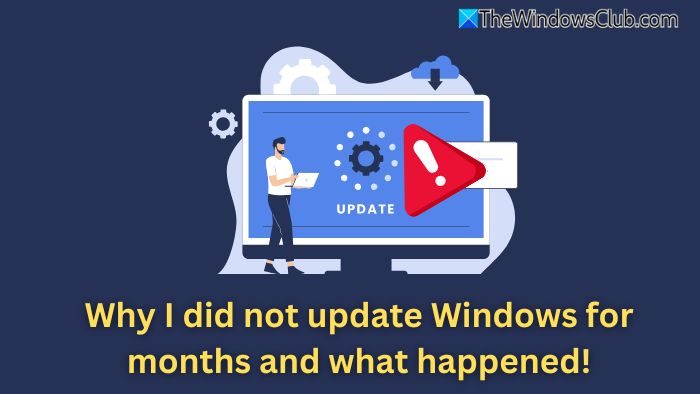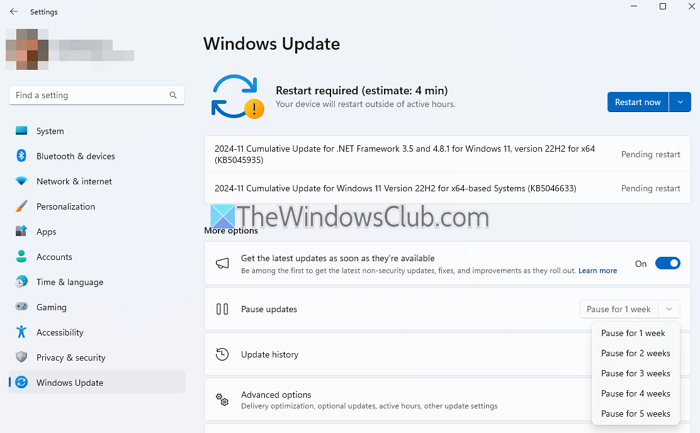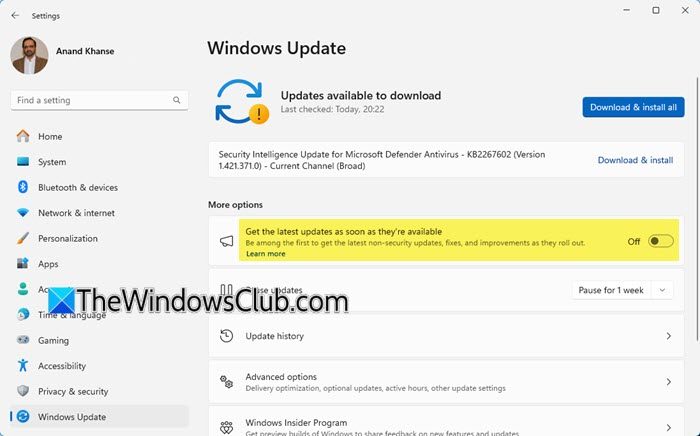Windows Updates are often infamous for causing issues. Looking at the user reports in the forums, you will know you are fortunate if a Windows Update did not break anything for you. A few months ago, I chose not to update Windows and figure out what would happen if I kept avoiding the updates.

Why I did not update Windows 11 for months
One of the primary reasons I did not update Windows is that I didn’t want to risk having to troubleshoot Windows Upgrade problems or roll back or reinstall Windows. The time and effort involved, not to mention the hassle of recovering files, were just too much. That would be too much to manage, especially the amount of time that goes into bringing back stuff, creating a bootable USB and so on.
I remember updating a Windows KB only to receive a Blue screen or death right after it. I had to return home, create a bootable USB, and reinstall Windows. Thankfully, I have everything on the cloud, and getting the files back wasn’t an issue.
Similarly, one of the updates made everything slow, and I had to roll back or uninstall the update.
I decided to pause Windows Updates for a few months and see what happens.
So, I first went to Windows Settings and paused Windows Updates for the next five weeks. Microsoft Windows offers that option, and after that, I kept ignoring anything that showed up, never shutting down Windows; I just put it to Sleep and was done with it.

If you wish you can also follow these methods to completely block Windows Update or use these free Windows Update blocker tools.
To my surprise, nothing major happened. Windows continued to work as usual, and I was extra cautious not to accidentally download anything unnecessary because if there was a vulnerability that needed to be patched, I would not know.
However, I tracked updates from another PC, and looking at them got me a little edgy. Some updates were related to the .NET framework, some were security updates, and others were cumulative.
Nothing happened, and I could work smoothly for almost a year!
That said, I realized Windows updates meant different things to everyone i.e. different implications for consumers vs. businesses.
The point is that while consumers update their computers faster, businesses wait until their apps and software are ready. Moving from one version to another is a cost. For some, it is hardware (Windows 11 required TPU); for others, it is a development cost.
Even if we leave the business side aside, one of the recent updates for Windows 11, the 24H2, caused many issues, and forums are full of questions about them. And this is not something new. While Microsoft tries to improve it every time, every major release has bugs derailing some users.
So, while my writing that not updating Windows was smooth for me is correct, it may not be the same for everyone. If it worked for me, it may not work for others. For example, if an update on Windows were needed for an app to work or fix something, you would miss that.
What would you miss if you didn’t update Windows for months?
You might not notice much unless it’s a major update, but not updating Windows leaves you more vulnerable to security threats and a higher chance of facing issues like ransomware or account corruption.
The only relief was that Windows Security did an excellent job throughout and caught anything suspicious! If you are careful enough, you don’t need another security software – just make sure you are using the best Windows Defender settings.
That said, you might be unable to stop Windows from updating, especially if you need to start your PC. I remember Microsoft forcing consumers to update to Windows 22H2 if they planned to restart and shut down the PC.
Potential Gaming or other performance issues
This is a grey area. Sometimes, game developers roll out updates based on fixes from Windows or when Windows updates break something. We have seen many error code reports where gamers could launch Steam, a game crashes when launched, and so on.
So, the best way to update would be to check what is happening. Someone will update their PC and report about it. If you have a similar config or the same game, skip it for some time.
What is the balanced way for consumers to update Windows 11?
I would say that you should delay the updates but do it only for a certain period. For example, you can use the delay update feature for a maximum of five months, and then Windows will force you to update. By then, you’ll have cumulative updates, which combine multiple patches into a single download, making it easier to catch up without too many disruptions.

The second feature you should turn off is the option to Get the latest updates as soon as they are available. Microsoft never rolls out updates to all PCs in one go. They are staggered, and sometimes, updates are based on configurations.
To avoid the risks of missing important updates, consider delaying updates for a maximum of five months. By the time you update, most bugs will have been ironed out, and you’ll be in a better position to enjoy the latest features with fewer problems.
Leave a Reply